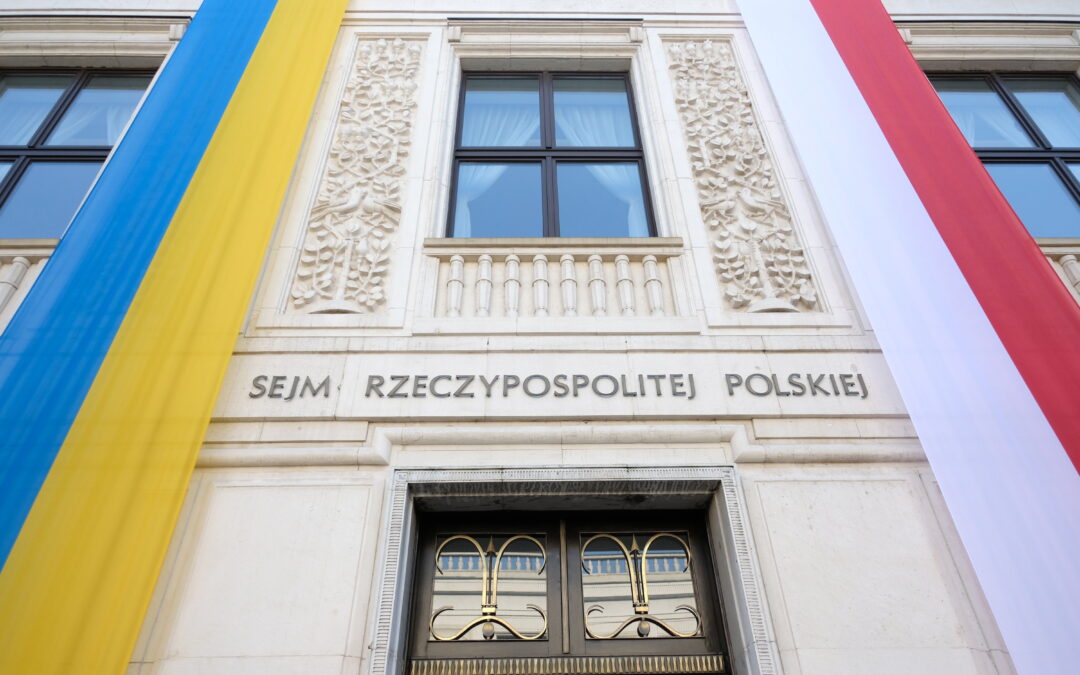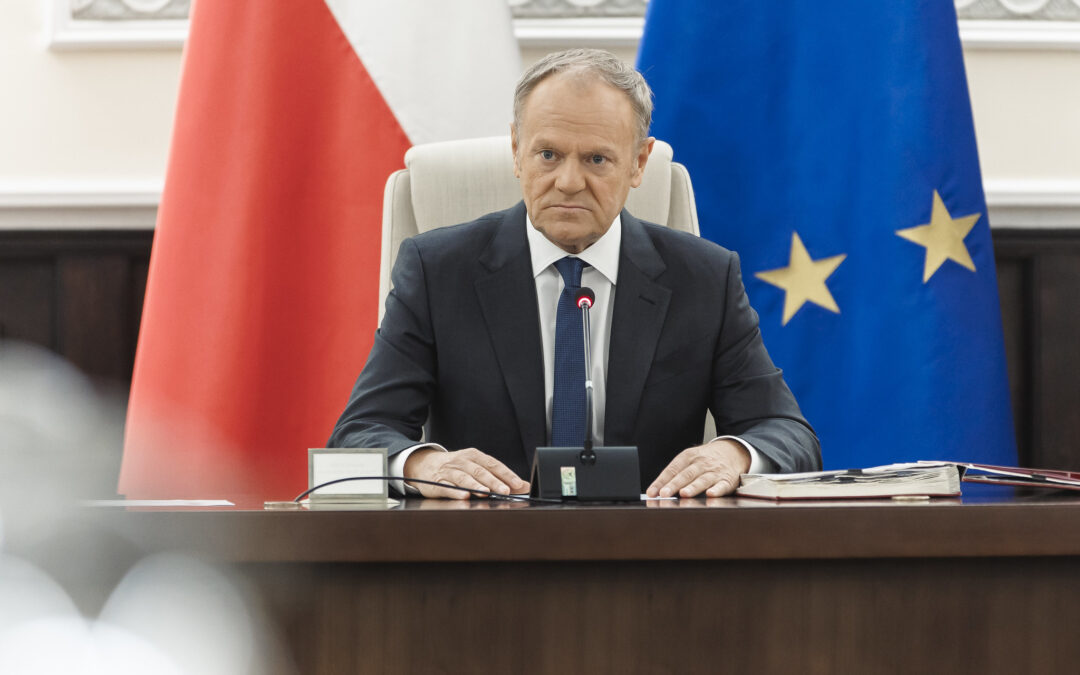Keep our news free from ads and paywalls by making a donation to support our work!

Notes from Poland is run by a small editorial team and is published by an independent, non-profit foundation that is funded through donations from our readers. We cannot do what we do without your support.
Far-right leader Sławomir Mentzen has warned that Poland “cannot allow” Ukrainians, who are the country’s largest immigrant group, to have representation in parliament because they will pursue their own interests at the expense of Poland’s.
His remarks come in the context of discussions over plans to toughen the criteria for foreigners to obtain Polish citizenship, including extending the amount of time they have to reside in Poland before being eligible.
Opposition-aligned President Karol Nawrocki last week proposed legislation to introduce such changes. Yesterday, the government announced that it was working on its own similar plans.
Ukraińcy w Polsce chcą mieć coraz większy wpływ na naszą politykę!
Jest ich już tu 2 miliony, a teraz planują zdobyć reprezentację w Sejmie i to już w 2027 roku!
Ich dziennikarze piszą artykuły, w których wyrażają oburzenie, że nie chcemy pozwolić na to, aby to oni rządzili… pic.twitter.com/tvK4WFVm0l
— Sławomir Mentzen (@SlawomirMentzen) October 6, 2025
“Ukrainians in Poland want to have an increasingly greater influence on our politics!” declared Mentzen – who finished third in May’s presidential election with 15% of the vote – on Monday. “There are already two million of them here, and now they plan to gain representation in the Sejm as early as 2027!”
“We cannot allow Ukrainians to have their own representation in the Sejm,” he added, referring to the more powerful lower house of parliament. “MPs elected by Ukrainians will surely take care of Ukrainian interests. For us, Polish interests should be the most important!”
Mentzen pointed to an article published on Friday by author Olena Babakova in Ukrainian news outlet European Pravda, in which she discussed the growing number of Ukrainians who may seek Polish citizenship in the coming years and how they could influence the country’s politics.
“Assuming that 70-80% of Ukrainians who have already received long-term residence permits in Poland will want to apply for a Polish passport, this gives tens of thousands of applicants over the next five years,” wrote Babakova.
“These numbers…are enough to at least begin to influence the outcome of the elections in specific districts where foreigners most often live,” she added. “Simply put, Ukrainian migrants could possibly get a chance for their own political representation in the Sejm as early as 2027.”
The balance of power in the Sejm decides which party or coalition can form a government in Poland. The next elections to the chamber are due to take place in 2027.
Babakova argued that it would be “a normal and good development” for Ukrainians to have more say in political affairs. “What is abnormal is a situation where a significant part of society participates in creating common prosperity but has no influence on the course of affairs in the country.”
Ukrainian immigrants pay more in taxes than they receive in benefits, a report by Poland's National Development Bank has concluded.
The research also indicated that Ukrainians contribute between 0.5% and 2.4% to Poland's annual GDP growth https://t.co/KhXxLtif5W
— Notes from Poland 🇵🇱 (@notesfrompoland) March 15, 2025
That argument was, however, rejected by Mentzen, whose Confederation (Konfederacja) party has 16 seats in the 460-seat Sejm and, according to recent polls, is now the country’s third most popular party, with average support of around 13%.
“[Ukrainian] journalists write articles in which they express outrage that we do not want to allow them to rule our country,” wrote Mentzen. “They feel entitled to tell Poles how our homeland should look! They have no right to do this. Let’s not allow foreign interests to decide Poland’s future!”
In a further post on X, the far-right leader also declared that Poland “absolutely must extend the time required to obtain Polish citizenship”, adding “let’s stop granting Polish citizenship to Ukrainians!”
Last year, Poland granted citizenship to a record 16,342 foreigners, with Ukrainians accounting for over half of recipients.
A record 16,342 foreigners were granted Polish citizenship in 2024. That was 37% more than in the previous year, marking the fastest pace of growth in over a decade.
Ukrainians accounted for just over half of last year’s recipients https://t.co/yH0FQsjvX3
— Notes from Poland 🇵🇱 (@notesfrompoland) August 29, 2025
Last week, President Nawrocki, who was elected in June with the support of the national-conservative opposition Law and Justice (PiS) party, submitted legislation that would increase the period of residency required to obtain citizenship from three to ten years.
The justification for the bill argues that the current three-year requirement “is one of the shortest in the European Union” and that a longer period is needed to “create conditions conducive to fuller integration of foreigners before granting them Polish citizenship”.
On Monday this week, the interior ministry’s official responsible for immigration issues, Maciej Duszczyk, announced that they had also “been working for several months” on proposed new rules for obtaining citizenship.
The measures, which are due to be unveiled at the end of October, would relate to the length of stay before obtaining citizenship (including for foreigners of Polish descent), tax residency, and a citizenship test, said Duszczyk.
Pod koniec października w @MSWiA_GOV_PL przedstawimy pełny pakiet rozwiązań dotyczących polskiego obywatelstwa, nad którym pracujemy od kilku miesięcy.
W tym:
-minimalna długość pobytu w🇵🇱, także dla cudzoziemców polskiego pochodzenia;
-rezydencja podatkowa;
-test na obywatelstwo— Maciek Duszczyk (@MaciekDuszczyk) October 6, 2025
Over the last decade, Poland has experienced levels of immigration unprecedented in the country’s history and among the highest anywhere in Europe. For six years running between 2017 and 2022, Poland issued more first residence permits to immigrants from outside the EU than any other member state.
The majority of arrivals have been from Ukraine, with an estimated 1.5 to 2 million Ukrainians – including refugees, econonomic migrants and students – now living in Poland, meaning they make up around 4-5% of the country’s population.
Studies published this year by the United Nations and Poland’s National Development Bank (BGK) have found that Ukrainians have significantly boosted Poland’s GDP and state budget.
However, recent months – and in particular this year’s presidential election campaign – have also seen hardening rhetoric towards Ukrainians in Poland from politicians in both the opposition and ruling coalition.
President @NawrockiKn has signed into law a government bill extending support for Ukrainian refugees in Poland but making access to certain social benefits for them and other foreigners conditional upon being in employment
https://t.co/mt5vcT7ZDU— Notes from Poland 🇵🇱 (@notesfrompoland) September 26, 2025

Notes from Poland is run by a small editorial team and published by an independent, non-profit foundation that is funded through donations from our readers. We cannot do what we do without your support.
Main image credit: Slawomir Kaminski / Agencja Wyborcza.pl

Daniel Tilles is editor-in-chief of Notes from Poland. He has written on Polish affairs for a wide range of publications, including Foreign Policy, POLITICO Europe, EUobserver and Dziennik Gazeta Prawna.



















